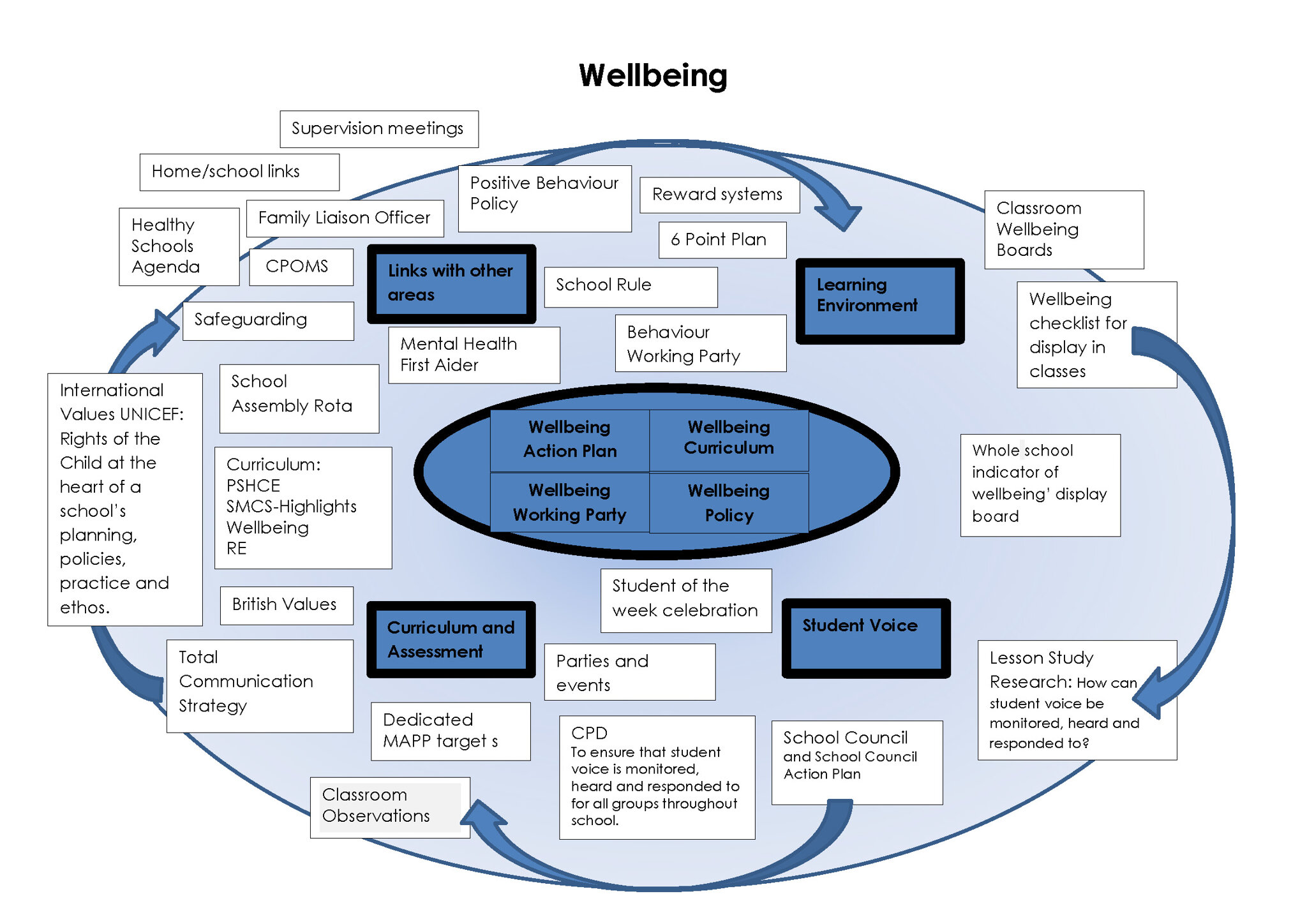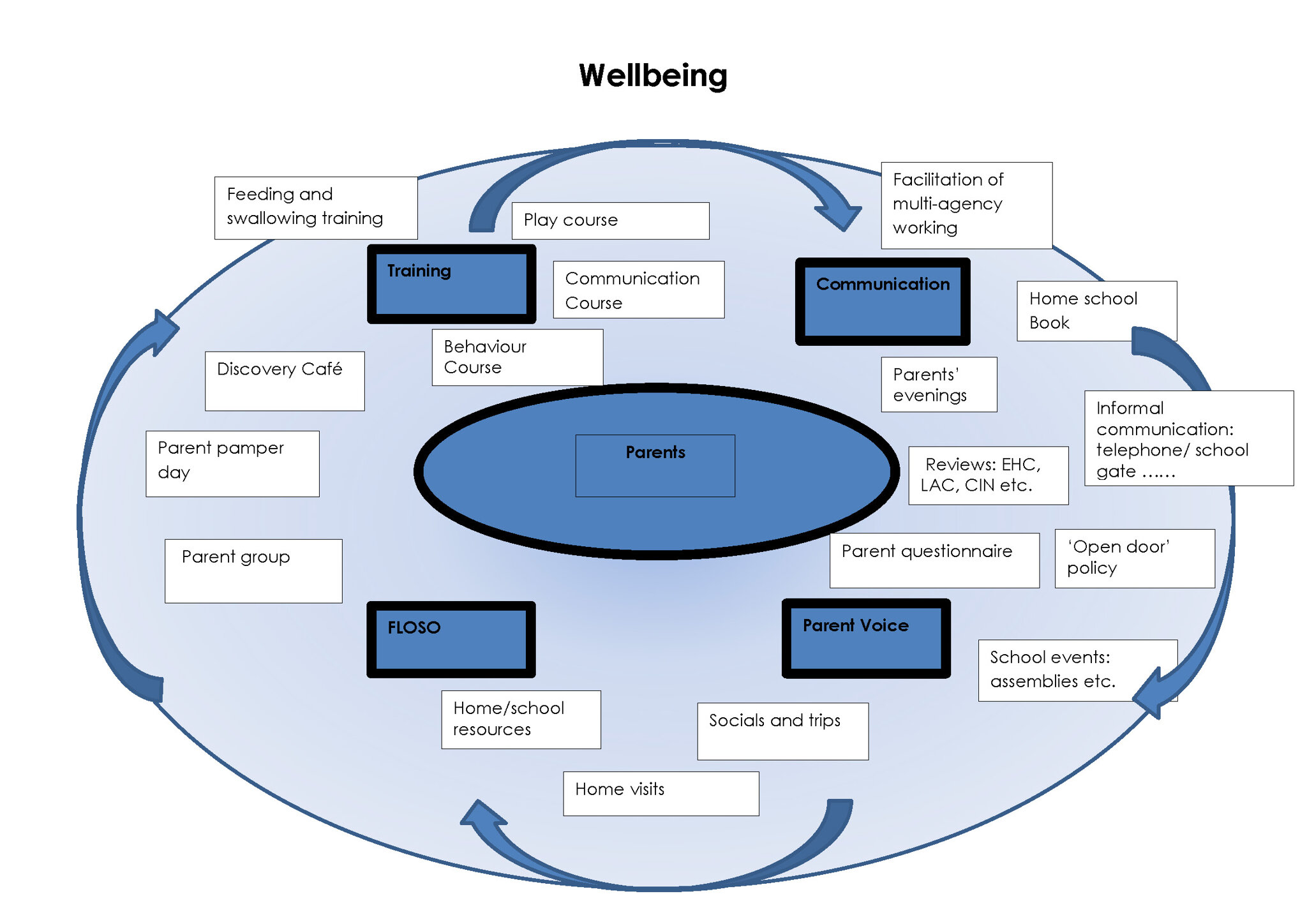Wellbeing within the school community is essential to ensure that our students learn and thrive.
There are three main strands:
- Students
- Staff
- Parents
Students
Wellbeing is critical to cognitive development and social and emotional development.
At Castle Hill School, wellbeing is explicit within all areas of the curriculum and wellbeing practices are visible within the learning environment, enabling pupils to feel confident, express emotions, build good relationships, live productively, cope with stresses and adapt in times of change. Every pupil has a social/ emotional target in their EHC Plan, from which wellbeing MAPP targets are created, which in turn inform medium term and short term planning, to ensure that the individual wellbeing of the pupils is met. Pupil wellbeing underpins practices across school, most importantly those relating to the UNICEF Convention on the Rights of the Child, as well as Student Voice and Healthy Schools Agenda. Wellbeing is promoted through the Curriculum Guides. Wellbeing boards in classrooms and around school celebrate success and provide a source of information to staff. Specific assemblies address various aspects of pupil wellbeing.
In July 2021, we were delighted to be awarded the School Mental Health Award Gold, through Leeds Beckett University. This award reflects our ongoing commitment to excellence in mental health and wellbeing strategies, structures, practices, and outreach.
The Wellbeing Working Party provides a forum for discussion on pupil wellbeing and reflection on the Wellbeing Policy. In addition, the Wellbeing Working Party works in collaboration with the Positive Behaviour Working Party and the Positive Behaviour Policy supports pupil wellbeing.
These are our indicators of good wellbeing.
- Confidence: Feeling confident in yourself and having positive self-esteem.
- Emotions: Feeling and expressing a range of emotions.
- Relationships: Building and maintaining good relationships with others.
- Engaging: Feeling engaged with the world around you.
- Being productive: Living and working productively.
- Coping: Coping with the stress of daily life.
- Adapting: Adapting in times of change and uncertainty.
Students Wellbeing
Staff
In a recent staff survey (September 2024) the overwhelming majority of respondents expressed their pride and enjoyment of working at Castle Hill School. Please click here for the full results.
Here at Castle Hill we create a happy working environment which allows staff to thrive and deliver an outstanding education for our students. Our Staff Wellbeing Officers/Champions coordinate our monthly staff wellbeing meetings and deliver a variety of ongoing wellbeing projects including our; special friend scheme, flower fund project, massage for staff sessions, birthday board, staff star award and our gratitude board.
The Senior Leadership Team work closely with our Wellbeing Champions and provide a wide variety of ongoing training opportunities to promote health and happiness. Courses to date include: Thrive and Flourish, Resilience, How to sleep and Healthy Lifestyles. Our mentor scheme here at Castle Hill also ensures that all staff are supported and developed within their working environment.
We also work closely with Huddersfield University to develop our Resilience Mentor programme.
We have three qualified Mental Health First Aiders within school.
We have recently enhanced the school’s contract with Kirklees Employee Health Care to ensure a broader Wellbeing offer is available including; self-referral, physiotherapy, healthy lifestyle and counselling.
Our approach to wellbeing is quality assured through staff attendance and the annual staff questionnaire.
Staff Wellbeing
Teacher Workload
We address teacher workload issues by the provision of:
- smart CPD
- early career support networks
- transition training day to assist with transition preparation
- comprehensive curriculum guides and subject area pathways to assist with planning
- curriculum release time.
Parents
We work closely with families to ensure that our parents/carers have a strong voice within our community.
Communication is essential and ongoing lines of communication are promoted on an ongoing basis through home/school books, telephone conversations, face to face informal meetings, reviews and parents evenings. We also provide a variety of wellbeing opportunities for parents and families including social events such as coffee mornings and seasonal socials.
We work tirelessly to provide an ongoing package of support and assistance for families ensuring that lines of communication are open and effective between school, parents and
muti-agency teams.
We also provide enrichment and wellbeing opportunities for parents including trips, socials and our regular parents’ group meetings.
We also help to facilitate educational advice and guidance through our annual education workshop offer.
Through this process parents can join other parents and professionals and discuss issues related to education and behaviour.
Parent Wellbeing
Websites and Organisations to support Mental Health
This document provides information on websites and organisations recommended by MHFA (Mental Health First Aid) England, which supports families and young people with their mental health. This document includes resources and advice for supporting children and families around COVID-19.
Apps to support Mental Health
This document provides information on Apps recommended by MHFA (Mental Health First Aid) England, which supports families and young people with their mental health.

